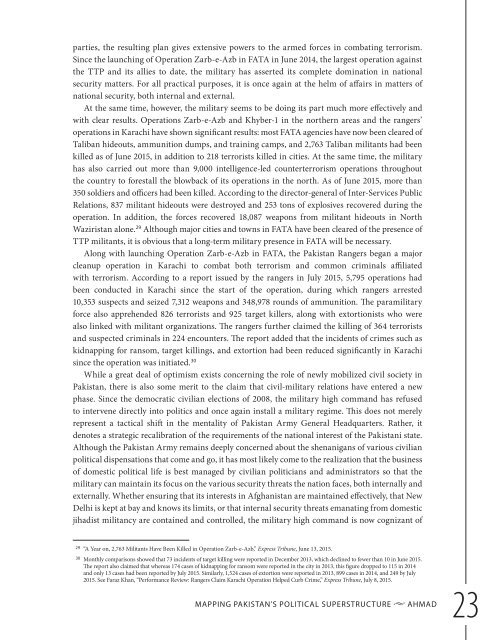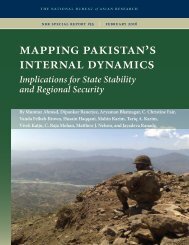pakistan’s
SR55_Mapping_Pakistan_February2016
SR55_Mapping_Pakistan_February2016
You also want an ePaper? Increase the reach of your titles
YUMPU automatically turns print PDFs into web optimized ePapers that Google loves.
parties, the resulting plan gives extensive powers to the armed forces in combating terrorism.<br />
Since the launching of Operation Zarb-e-Azb in FATA in June 2014, the largest operation against<br />
the TTP and its allies to date, the military has asserted its complete domination in national<br />
security matters. For all practical purposes, it is once again at the helm of affairs in matters of<br />
national security, both internal and external.<br />
At the same time, however, the military seems to be doing its part much more effectively and<br />
with clear results. Operations Zarb-e-Azb and Khyber-1 in the northern areas and the rangers’<br />
operations in Karachi have shown significant results: most FATA agencies have now been cleared of<br />
Taliban hideouts, ammunition dumps, and training camps, and 2,763 Taliban militants had been<br />
killed as of June 2015, in addition to 218 terrorists killed in cities. At the same time, the military<br />
has also carried out more than 9,000 intelligence-led counterterrorism operations throughout<br />
the country to forestall the blowback of its operations in the north. As of June 2015, more than<br />
350 soldiers and officers had been killed. According to the director-general of Inter-Services Public<br />
Relations, 837 militant hideouts were destroyed and 253 tons of explosives recovered during the<br />
operation. In addition, the forces recovered 18,087 weapons from militant hideouts in North<br />
Waziristan alone. 29 Although major cities and towns in FATA have been cleared of the presence of<br />
TTP militants, it is obvious that a long-term military presence in FATA will be necessary.<br />
Along with launching Operation Zarb-e-Azb in FATA, the Pakistan Rangers began a major<br />
cleanup operation in Karachi to combat both terrorism and common criminals affiliated<br />
with terrorism. According to a report issued by the rangers in July 2015, 5,795 operations had<br />
been conducted in Karachi since the start of the operation, during which rangers arrested<br />
10,353 suspects and seized 7,312 weapons and 348,978 rounds of ammunition. The paramilitary<br />
force also apprehended 826 terrorists and 925 target killers, along with extortionists who were<br />
also linked with militant organizations. The rangers further claimed the killing of 364 terrorists<br />
and suspected criminals in 224 encounters. The report added that the incidents of crimes such as<br />
kidnapping for ransom, target killings, and extortion had been reduced significantly in Karachi<br />
since the operation was initiated. 30<br />
While a great deal of optimism exists concerning the role of newly mobilized civil society in<br />
Pakistan, there is also some merit to the claim that civil-military relations have entered a new<br />
phase. Since the democratic civilian elections of 2008, the military high command has refused<br />
to intervene directly into politics and once again install a military regime. This does not merely<br />
represent a tactical shit in the mentality of Pakistan Army General Headquarters. Rather, it<br />
denotes a strategic recalibration of the requirements of the national interest of the Pakistani state.<br />
Although the Pakistan Army remains deeply concerned about the shenanigans of various civilian<br />
political dispensations that come and go, it has most likely come to the realization that the business<br />
of domestic political life is best managed by civilian politicians and administrators so that the<br />
military can maintain its focus on the various security threats the nation faces, both internally and<br />
externally. Whether ensuring that its interests in Afghanistan are maintained effectively, that New<br />
Delhi is kept at bay and knows its limits, or that internal security threats emanating from domestic<br />
jihadist militancy are contained and controlled, the military high command is now cognizant of<br />
29 “A Year on, 2,763 Militants Have Been Killed in Operation Zarb-e-Azb,” Express Tribune, June 13, 2015.<br />
30 Monthly comparisons showed that 73 incidents of target killing were reported in December 2013, which declined to fewer than 10 in June 2015.<br />
The report also claimed that whereas 174 cases of kidnapping for ransom were reported in the city in 2013, this figure dropped to 115 in 2014<br />
and only 13 cases had been reported by July 2015. Similarly, 1,524 cases of extortion were reported in 2013, 899 cases in 2014, and 249 by July<br />
2015. See Faraz Khan, “Performance Review: Rangers Claim Karachi Operation Helped Curb Crime,” Express Tribune, July 8, 2015.<br />
MAPPING PAKISTAN’S POLITICAL SUPERSTRUCTURE u AHMAD<br />
23



